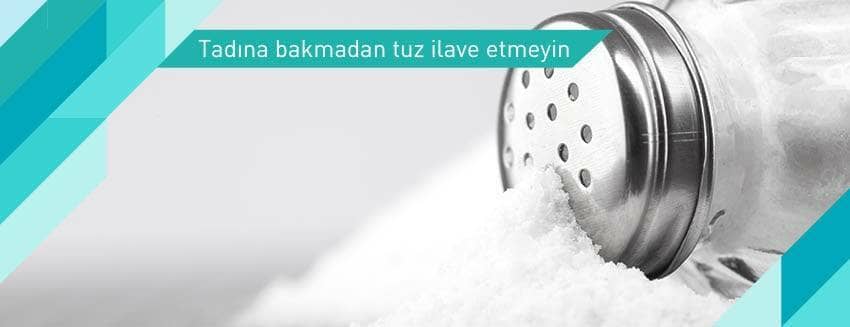
Low salt consumption, which is frequently encountered in long-term dieters, causes impaired heart rate control, muscle fatigue and cloudy mind. According to experts stating that the daily need is met with approximately 1 teaspoon of salt, salt should not be added without tasting the food and salt shakers should be removed from the table.
Üsküdar University NPISTANBUL Hospital Nutrition and Diet Specialist Assist. Assoc. Prof. Dr. Gizem Köse drew attention to the importance of healthy and careful salt consumption regarding the Salt Caution Week we are in.
Both too little and too much salt cause harm
Assist. Assoc. Prof. Dr. Gizem Köse stated that long-term excessive salt consumption increases the risk of stroke and said the following: "When we look at the content of salt, it consists of sodium and chlorine. Sodium, which has an important role in the regulation of blood pressure, increases blood pressure in excessive consumption and causes hypertension. Long-term excessive salt consumption increases the risk of stroke. Especially in individuals with some kidney diseases, salt consumption should be limited as there will be a decrease in sodium excretion. In addition, low sodium consumption, which is frequently encountered in long-term dieters, causes impaired heart rate control, muscle fatigue and confusion. Sodium is an essential mineral for the body. It can be protected from its harms by being aware of the consumption limit."
Iodized salt should be used
"If you do not have a problem with goiter, you should pay attention to buying iodized salt," said Assist. Assoc. Prof. Dr. Gizem Köse, "With the emergence of diseases related to iodine deficiency, iodine was added to salts in the 80s. However, iodine is a volatile mineral. When salt is added during cooking, iodine evaporates and loses its effect. Therefore, if it is added after cooking the food, the salty taste is taken more clearly, thus reducing its consumption and indirectly increasing iodine consumption. If hypertension can be controlled, salts with high mineral content such as Himalayan salt can be used. Using iodized salt as salt is very important especially for iodine intake. You can also use rock salt in salads if you want it to be rich in minerals."
1 silme teaspoon of salt meets the daily need
Noting that according to the recommendation of the World Health Organization, 2400 mg of sodium consumption per day is sufficient and an average of 5 grams of salt intake is recommended, Assist. Assoc. Prof. Dr. Gizem Köse said, "Approximately 1 silme teaspoon of salt meets the daily need. Since it may be difficult to measure this amount, 1 silme tablespoon of salt should not be exceeded instead of throwing salt by eye in the preparation of pot dishes. When measured according to the portion, the amount that falls on an average meal will meet the amount to be taken daily, "he warned.
Remove the salt shaker from the table
Stating that the most important point to be considered in salt consumption is not to add salt without tasting the food, Köse listed his other recommendations as follows:
"Following a study conducted in 2011, salt shakers were removed from the tables in most of the restaurants in the future. Salt is added upon the request of the consumer. The aim of this study is to reduce the salt used extensively in our culture. The first step will be to remove salt shakers from the table at home in daily life. In addition, the consumption of prepackaged foods with high salt content, snacks, crackers, ready-made pasta-soups, canned vegetables, salad dressings and pickles should also be considered. If these are included in the daily diet, the use of salt should be almost non-existent. A common misconception about salt is that it is not written on packaged foods and that the other content is low. When you eat a packet of pretzels, you will reach almost the amount that should be consumed daily and only in one meal... It is not healthy to avoid salt completely, so it is beneficial to continue with the 'less is more' system, which is also valid for other foods."
We consume too much salt
Stating that the salt consumption in our country is too high, Assist. Assoc. Prof. Dr. Gizem Köse said, "The sodium intake of 13 thousand 707 people in the database of the Turkish Nutrition and Health Survey 2010 was found to be high, except for the salt they added to their meals. Salt is consumed in excessive amounts in Turkey. In general, 2.5-3.5 times the recommended amount of salt is consumed, that is, about 1 tablespoon of salt."
